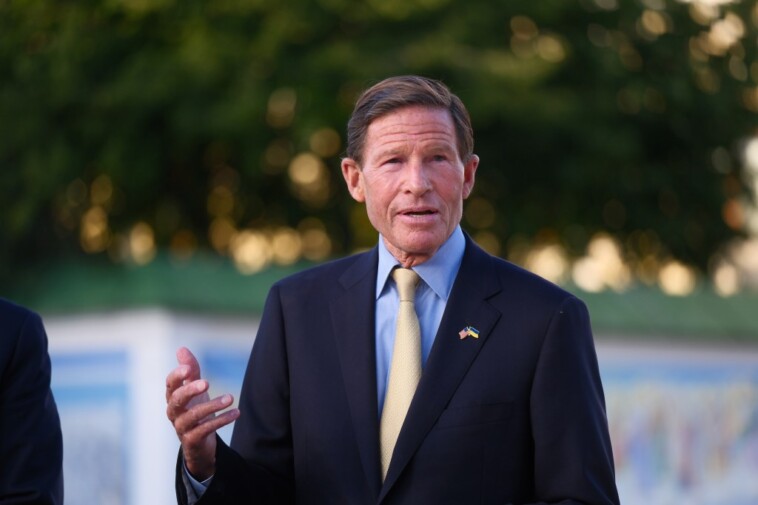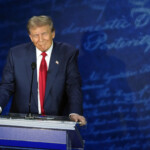Senators from both parties said Thursday that they were “appalled” by the security failures that led to the assassination attempt against former President Donald Trump July 13 and want more information from the Department of Homeland Security ahead of an expected report on the near-tragedy.
Members of the Senate Homeland Security and Governmental Affairs Committee met with acting Secret Service Director Ronald Rowe for a closed-door briefing about the shooting in Butler, Pa. that killed Trump rally-goer Corey Comperatore and wounded the 45th president and two others.
“I think the American people will be shocked, astonished and appalled by what we will report to them about the failures of the Secret Service in this assassination attempt of a former president,” said Sen. Richard Blumenthal (D-Conn.), who chairs the panel’s Permanent Subcommittee on Investigations.
“But I think they also ought to be appalled and astonished by the failure of the Department of Homeland Security to be more forthcoming, to be as candid and frank as it should be to them in terms of providing information,” he added after exiting the briefing.
Sen. Ron Johnson (R-Wis.), the top Republican on the investigatory subcommittee, said members expressed “frustration” with Rowe during the briefing.
“There is a lot that we don’t know yet, and I think there is some frustration that was voiced, I think with Acting Director Rowe,” Johnson told reporters. “He’s making the commitment to provide more information.”
Homeland Security Committee Chairman Gary Peters (D-Mich.) said the sit-down with the Secret Service yielded “a lot of information,” but the panel had “a ways to go” and would release an interim report “shortly.”
“It’s going to identify very specific errors that were made in this,” added committee Ranking Member Rand Paul (R-Ky.). “To me, it’s still inexcusable that a guy for 90 minutes before a rally has a rangefinder and you don’t stop the proceeding.”
Peters, Paul, Johnson and Blumenthal stressed that the probe has been and the report will be entirely bipartisan. Johnson said he expects the preliminary document to be released before Congress breaks for its pre-election recess at the end of this month.
The lawmakers also emphasized that there had not been enough accountability within the Secret Service.
Asked whether more people should resign, Blumenthal answered: “Unquestionably and indisputably, there needs to be more accountability. People need to be held responsible.”
“Without accountability, this kind of failure and lapse will happen again because there needs to be that sense that someone is the point person,” he said.
Law enforcement flagged would-be assassin Thomas Matthew Crooks, 20, as a “suspicious” attendee of the Trump event at the Butler Farm Show grounds more than an hour and a half before he climbed on top of the roof of the AGR International building and took aim at the 45th president on the main stage.
Crooks fired eight rounds, striking Trump, 78, in the right ear, killing Comperatore, and critically injuring David Dutch, 57, and James Copenhaver, 74. A Secret Service counter-sniper fired a ninth bullet that felled Crooks.
Everything we know about the Trump assassination attempt
- 20-year-old Thomas Matthew Crooks was identified as the shooter who attempted to assassinate Donald Trump during a campaign rally in Pennsylvania.
- Crooks was shot dead by Secret Service agents.
- The gunman grazed Trump’s ear, killed a 50-year-old retired fire chief, and injured two other rally-goers.
- Investigators detailed Crooks’ search history to lawmakers, revealing that he looked for the dates of Trump’s appearances and the Democratic National Convention.
- Crooks’ search history also revealed a broad interest in high-profile people and celebrities, regardless of their political affiliation, FBI officials reportedly said.
- Trump exclusively recounted surviving the “surreal” assassination attempt with The Post at the rally, remarking, “I’m supposed to be dead.”
- High-profile politicians, including President Biden and Vice President Kamala Harris, addressed the nation about the shooting, calling it “a heinous, horrible and cowardly act.”
Since then, Secret Service whistleblowers, congressional hearings and committee inquiries have revealed security lapses that allowed Crooks to begin shooting at the former president with a clear line of sight just 130 yards away.
Agents on the ground got the message that Crooks was a “threat” just 10 minutes before Trump began speaking — but failed to act.
“At 6:08 [p.m.], man on a roof, should’ve stopped him,” Paul recounted to reporters after the briefing. “They say the walkie-talkies didn’t communicate with each other. Someone should’ve been yelling from the rooftops.”
“That information was radioed to the security tent, the Security Command and Control, about 6:10 [p.m.], there’s still a few seconds left,” he said.
“I have a great deal of respect for law enforcement,” Paul added. “I mean, it’s a tough job, and people do make mistakes, but I think the people in charge of security that day shouldn’t be doing it again.”
Rep. Michael Waltz (R-Fla.) told Fox News’ “The Story” Thursday afternoon that Trump’s life was jeopardized by a “complete breakdown in communication.”
“Different entities were seeing the shooter, were seeing them with the rangefinder, were seeing someone on the roof that people were calling in to local law enforcement. That wasn’t relayed over the common radio [network],” he told Fox News’ Martha MacCallum.
“A lot of people are asking, ‘Why was President Trump allowed to go on with this suspicious activity?’ Well, the shift lead, his core protective detail, didn’t know – it wasn’t relayed to him,” Waltz added. “What was being relayed was kind of point-to-point over text message, over phone, and they didn’t follow the protocols of get it out there … [that] ‘We have someone suspicious in this area, everyone be aware.’”
Keep up with today’s most important news
Stay up on the very latest with Evening Update.
Thanks for signing up!
Authorities later found explosives in Crooks’ car parked at the rally site and a remote transmitter on his dead body, but neither the Secret Service nor the FBI has been able to determine the shooter’s motive.
“The failure of the Department of Homeland Security to be more forthcoming fuels the conspiracy theories that have no basis in fact,” Blumenthal said.
FBI Pittsburgh Field Office Special Agent in Charge Kevin Rojek told reporters last month that Crooks “conducted more than 60 searches related to President Biden and former President Trump” as part of “extensive attack planning” — and even searched for information about the Republican and Democratic national conventions.
“We have not uncovered any credible evidence indicating the subject conspired with anyone else,” Rojek also said, and rejected any speculation about a second shooter.
Crooks posted on Discord and may have also done so on the alt-right social media platform Gab, according to its CEO Andrew Torba, who alleged that the shooter had spread messages “in support of President Biden.”
The FBI disclosed that in addition to searches online — which included asking for details about the distance between assassin Lee Harvey Oswald and President John F. Kennedy — Crooks maintained overseas encrypted messaging accounts.
In addition to the Senate Homeland Committee, the FBI and DHS, a House select task force and the DHS Office of the Inspector General are investigating aspects of the shooting.










